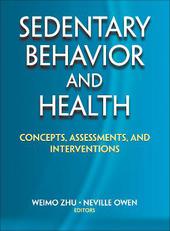
|
Sedentary Behavior and Health: Concepts, Assessments, and Interventions
Hardback
Main Details
| Title |
Sedentary Behavior and Health: Concepts, Assessments, and Interventions
|
| Authors and Contributors |
By (author) Weimo Zhu
|
|
Edited by Neville Owen
|
| Physical Properties |
| Format:Hardback | | Pages:456 | | Dimensions(mm): Height 279,Width 216 |
|
| Category/Genre | Human biology
Health and Personal Development |
|---|
| ISBN/Barcode |
9781450471282
|
| Classifications | Dewey:613 |
|---|
| Audience | | Postgraduate, Research & Scholarly | |
|---|
| Illustrations |
15 Halftones, black and white; 49 Illustrations, black and white
|
|
Publishing Details |
| Publisher |
Human Kinetics Publishers
|
| Imprint |
Human Kinetics
|
| Publication Date |
3 March 2017 |
| Publication Country |
United States
|
Description
From office jobs and long commutes to passive entertainment like television and video games, humans are sitting more than ever. Though lack of exercise has major health consequences, researchers are now examining the additional and widespread health risk of the simple act of sitting for extended periods. With research from leading scientists, Sedentary Behavior and Health: Concepts, Assessments, and Interventions presents evidence on sedentary behavior, its apparent health risks, and suggestions on measuring and altering this behavior. The highly respected international author team provides an interdisciplinary review of current research, examining scientific, public health, and broader social questions about the implications of sedentary behavior. These topics include humans' physiological predispositions, exacerbation of current health conditions like obesity and diabetes, and the design and ergonomics of offices and chairs. To examine the many facets of this developing area of study, Sedentary Behavior and Health is divided into five parts: - "Sedentary Behavior Concepts and Context" reviews the physiology of sedentary behavior, investigating current habits from the perspectives of evolution, industrial engineering, and design. - "Sedentary Behavior and Health" explores the relationship between sedentary behavior and several major chronic diseases, including obesity, cardiovascular disease, and low-back pain. - "Measuring and Analyzing Sedentary Behavior" explains research methods for understanding and measuring sedentary behavior in order to recognize patterns and design interventions. - "Sedentary Behavior and Subpopulations" covers issues, risks, and behaviors in groups such as children, working adults, older adults, and minorities. - "Changing Sedentary Behavior" provides methods and recommendations for improvement with environmental, social, community, worksite, and technology-based interventions. Included in this groundbreaking text are learning objectives, key concepts, and study questions to focus attention on key issues and reinforce concepts. Reviews of the literature in the field are presented, many with comparisons in table form, to provide the full scope of research. Sidebars throughout the text apply theoretical concepts to real-world scenarios. Inactivity is mismatched with many aspects of humans' genetic makeup. While it is becoming the new norm, the consequences of this behavior are emerging as a public health threat. Sedentary Behavior and Health will serve as a key reference for the rapidly emerging research area of sedentary behavior.
Author Biography
Weimo Zhu, PhD, is currently a tenured full professor in the department of kinesiology and community health at the University of Illinois at Urbana-Champaign. His major area of research is in kinesmetrics (i.e., measurement and evaluation in kinesiology). Dr. Zhu's primary research interests are the study and application of new measurement theories (e.g., item response theory) and models to the field of kinesiology. His research works have earned him international recognition. He is the editor in chief of the Research Quarterly for Exercise and Sport and a fellow of the American Academy of Kinesiology, American College of Sports Medicine, and Research Consortium of SHAPE America. He is a member of the Fitnessgram/Activitygram Advisory Committee. He is also a member of the editorial board for various academic journals and serves on the executive committees of several national and international professional organizations. Dr. Zhu was the chair of the Measurement and Evaluation Council of SHAPE America. Currently, Dr. Zhu is examining the application of advanced measurement and statistical techniques to several measurement issues in public health. A practical application of Zhu's theoretical work has been in the assessment of physical activity and sedentary behavior, and he is exploring a new idea and technologies to solve the problems raised. Neville Owen, PhD, is head of the Behavioural Epidemiology Laboratory at the Baker IDI Heart and Diabetes Institute, a National Health and Medical Research Council of Australia (NHMRC) senior principal research fellow, adjunct professor in the School of Public Health at the University of Queensland, honorary professorial fellow in the School of Population and Global Health at the University of Melbourne, and adjunct professor in medicine at Monash University. He was foundation professor of Human Movement Science and inaugural head of the School of Human Movement at Deakin University (1995-99) and director of the Cancer Prevention Research Centre at the University of Queensland (2002-11). His research deals with the prevention and management of diabetes, heart disease, and cancer through identifying health consequences, environmental determinants, and behavior-change strategies for physical inactivity and sedentary behavior. Owen has published more than 450 peer-reviewed papers and the book Physical Activity and Behavioral Medicine with James F Sallis. Thomson Reuters (2015) identified him as a highly cited researcher and among the world's most influential minds in the social sciences. He has been supported by grants from the NHMRC since 1992, including two grants for five-year programs (Physical Activity and Public Health; Sitting Less and Moving More: Population Health Research to Understand and Influence Sedentary Behaviour) and a grant from Centres of Research Excellence (Sitting Time and Chronic Disease Prevention: Measurement, Mechanisms and Interventions).
|